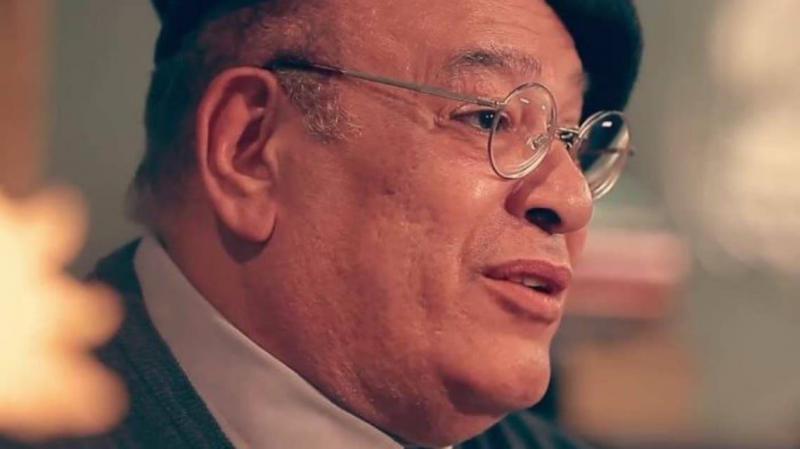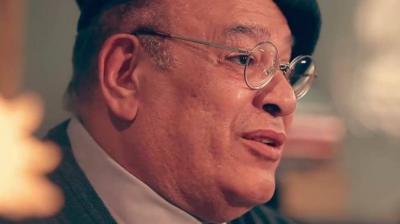The renowned artist Salah Abdallah presented four different faces during the current Ramadan season, each character having its distinct essence in the various works he participated in, including the series "Qasr Al-Nil," "Bent El-Sultan," "Faris Bela Jawaz," and "Hagmet Mortada." The latter holds a special place in his heart due to his long relationship with Ahmed Ezz, the lead actor, and his longing for collaborative work with him. In his interview with Al Arabiya.net, Abdallah revealed much about the behind-the-scenes of his Ramadan projects, his collaboration with singer Ali El-Hagar, the successful national series, and the concept of competition in this unprecedented Ramadan season.
**What motivated you to participate in "Hagmet Mortada" even though the role was honorary?**
Initially, I was indeed a guest star. However, as the events unfolded and shooting began, the role grew to be of significant importance. Several factors encouraged me to accept the series, as any work that speaks to national pride and enhances the youth's affiliation with their country is worth participating in, regardless of the role’s size. I previously participated last year as a guest in the series "El-Ikhtiyar," and I hoped to take part in the second season as well. Additionally, the entire team, from the writer, the director, and the stars, motivated me. I greatly missed working with Ahmed Ezz, as we hadn’t collaborated since the movie "El-Masalaha" in 2012. I was also pleased to have Hind Sabri on board, even though I only met her once during filming, along with Magda Zaki and the family cast, including Khaled Anwar and Mayan El-Sayed. I sensed this unique atmosphere for two years because we had halted filming due to the Covid-19 pandemic before we resumed with "Hagmet Mortada," aptly titled as we launched our assault this year.
**With your fondness for working with Ahmed Ezz, the audience perceives a charisma between you both on screen.**
When I see Ezz these days, beyond him being a star, I feel he is like my younger brother. I enjoy working with him because there is an understanding between us, and our relationship on set resembles a cat-and-mouse dynamic filled with laughter and fun, which creates a joyful working atmosphere. A significant common factor that has connected us since the beginning is the producer Wael Abdallah through the film "El-Rahina," which is one of my favorite works because I played an unexpected role in it, and our collaborations continued from there.
**Do you think the delayed release of the work after two years benefited it, especially in the context of another national work?**
In my opinion, this choice was correct and positively impacted the team. It provided us with time to revise some scenes, and the delay allowed us to finish filming some scenes outside of Egypt. We had initially halted due to the pandemic, which prevented the team from traveling due to airport closures globally; thus, we had to wait until the work could present itself convincingly.
**What is your opinion on the return of national drama to screens, big or small, after many years of stagnation?**
It’s very promising. There is a need to foster a sense of belonging in the new generation and connect them with their country’s reality, history, and present. However, the most crucial aspect is the diversity of values. The return started strongly with the film "El-Mamar," which resonated significantly, especially with young people who may not know about the 1967 setback or the 1973 war. The film provided them with crucial insights into this historical period. Following that, "El-Ikhtiyar" showcased the military's heroism and their fight against terrorism, particularly in Sinai, from before the January 25 Revolution, displaying what happened on June 30 after the regime's departure. Thus, national drama is essential and should be presented in an engaging narrative context and robust production. What I admired about "El-Ikhtiyar 2" was how director Peter Mimi blended scripted scenes with real events to counter claims of exaggeration or bias.
**Moving from "Hagmet Mortada" to "Qasr Al-Nil," with a different timeframe and various details, what motivated you to accept the role of Ezzat the lawyer?**
As I mentioned, the timeline is significant; "Qasr Al-Nil" unfolds in the 1950s and 60s, which was one of the main factors exciting me to participate, as I had not delved into works set in this era aside from "King Farouk" and "Nasser," both of which took place in the 40s and 50s. I was also eager to collaborate with director Khaled Merhi, as I have been following his work and greatly admire it. The writer, Mohamed Soliman Abd El-Mallik, has been a friend of mine for a long time, but we had never worked together before, so when they offered me to take part in this project, I was ready and became more enthusiastic when learning the character’s details.
**You portrayed the character of "Ezzat" with great craftsmanship, which was evident to the audience in your performance details?**
From the moment I read the script, I began immersing myself in the character’s nuances. Although "Ezzat" is from an older time period, I was keen to present him authentically without exaggeration, which the role did not require. Some expressions we deemed suitable for that era were used, but ultimately, the dialogue language falls back on the writer, who lights the way for us.
**You also appeared in the comedy "Faris Bela Jawaz" as a guest star. What is your viewpoint on choosing works with smaller roles?**
First and foremost, I believe smaller roles are the best path toward principal roles. My initial recognition in the artistic field stemmed from such small roles. As one gains experience, they realize the impact of the role far outweighs its size. Some scenes can deliver the same effect as an entire project. Some roles may be written yet go unnoticed by audiences, while others may perish in the first episodes but remain influential to the storyline until the end, lingering in the viewers' minds. Therefore, the importance of what I present and the message I convey to my audience through the role—and its impact on the whole work—is paramount.
**"Faris Bela Jawaz" belongs to the category of interconnected stand-alone episodes, wherein you appeared as a guest in only the first episode, but the events rely on your character, which appears in a few scenes.**
**Was your appearance in "Bent El-Sultan" supportive of Rogina?**
I am pleased to collaborate with her, even in a small scene. I hope this compelling dramatic plot opens doors for her to establish her presence on the drama scene throughout the season, given her diverse and distinguished roles that have been praised by all stars in Middle Eastern art. Indeed, I appeared as a guest during the events in an intriguing and distinct role, which encompasses elements and hidden secrets. I also enjoyed collaborating with screenwriter Ayman Salama and director Ahmed Shafiq, whom I have the utmost respect for, both professionally and personally.
**You surprised your audience with a musical collaboration with singer Ali El-Hagar and his brother Ahmed?**
I was thrilled about this collaboration, as Ali is a close friend, someone I've known for a long time, and I truly cherish him, as well as his brother Ahmed. I consider them family. When I penned the lyrics for the song titled "Ishtaqnalak," which carries a spiritual essence, Ali welcomed it warmly, assuring me that the song was distinguished, fresh, and potentially different, possessing creativity that would surprise the audience. He remarked, "I believe our fans across the Arab world will love it," which indeed came to fruition, with his brother Ahmed composing the music.
**You will return after Ramadan to the studio to film the series "Shaqqa 6," which revolves around horror and suspense. What are your thoughts on this theme that is starting to gain traction, and can we produce horror series that rival global works?**
There are indeed many horror works emerging successfully; it feels as if viewers enjoy being scared. The events of "Shaqqa 6" align with the same genre, focusing on suspense, and it consists of fifteen episodes. I star alongside Ruby, Ahmed Hatem, Mahmoud El-Bazawy, Rehab El-Gamal, Hany Adel, Saudi actress Haya Fiad, Hamza El-Eili, and Malak Qoura, with the screenplay and dialogue by Rafiq El-Qadi, Soad El-Qadi, Mahmoud Wahid, and Nabil Shaayeb, directed by Mahmoud Kamel.
**What are the behind-the-scenes reasons for the series "Ward" exiting the Ramadan lineup? And what is your view on collaborating with actress Hanan Motawi?**
It was a production decision based on certain circumstances, aiming to continue after Ramadan. I only shot for one day, capturing scenes tied to a particular scenario. I learned it was halted until after Ramadan, and I believe that Hanan Motawi is a remarkable actress, truly exceptional. I've known her for a long time, although we haven't encountered each other in any prior works, and in "Ward," I portray her father.




